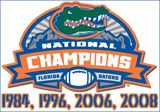NCAA Football, new and improved, now with shorter games!
UPDATED and CORRECTED
I was reading one of the threads on a Gator message board that was about Gators coach Urban Meyer's promise to battle the changes to the clock rules in college football. I believed that the clock rule was much ado about nothing. I suspected that after an initial shock that teams would adapt to the new rule change and that even though the number of plays in a game would go down, they would eventually come back up slightly as the adapting took place. The net result I believed would be shorter games with not too much of an impact on the numbers of plays. Some of the posters on this particular message board were saying that the networks were using the saved time sell more advertising. Anecdotally I can say that I think the Gators adapted to the clock rules as the 2006 season progressed. By the time of the BCS Championship game the Gators had eliminated most of the delay of game penalties that had plagued them earlier in the year when the shorter amount of time to get a play called caused confusion.
But I decided to analyze this a little more closely. This analysis is hardly scientific since the sample sizes are too small. You'd need to study more than the games of just one team over two years but I wanted to see what, if any, effect the clock rules had on the Gators.
In 2005 the Gators played 11 regular season games. One of those games (Vanderbilt) was an overtime affair and since the overtime, by necessity, made the game longer in terms of actual elapsed time I excluded it from the analysis.
For the remaining 10 games the Gators played in 2005 the average elapsed time from kickoff to completion was 198.7 minutes (3:18:42). In those games an average of 148 plays were run (including punts and kickoffs). The amount of minutes per play was 1.34 (1:20).
In 2006 the Gators played 12 regular season games. There were no overtime games. I did exlude the SEC Championship game in the analysis because I'm not sure if this kind of "post-season" game has a different length halftime or number of commercial breaks (more on that later).
For the 12 games analyzed for 2006 the average elapsed time from kickoff to completion was 197.7 minutes (3:17:42). In those games an average of 140 plays were run. The amount of minutes per play was 1.42 (1:25).
In summary, it appears that rule change shaved one minute off of each Gator game (on average) while decreasing the number of plays run by 8. The minutes per play increased by almost 5 seconds. Since we know that the each game has 60 minutes of actual playing time, and the elapsed times of the games was slightly shorter, and the number of plays played was less, we can only assume that commercial messages swallowed up most of what would have been saved time.
For example if we ran 140 plays (the avg. number from 2006) at the same time per play as 2005 (1:20) the games should have averaged 187.6 minutes (3:07:36). The difference between that and the actual elapsed time of the games in 2006 was 10 minutes (10:06).
Just to put it into perspective 10 minutes and 6 seconds is enough time to run twenty 30-second commercials.
Now I work in advertising, so I understand the need for ad sponsorship. Without it, our favorite sport would not be available to us to watch for free (or cheaply because most of us watch as part of some cable package). But this analysis suggests that there was some degree of sleight of hand with regards to the implementation of the new clock rules. We're getting less football and more commercials.
As a follow up to the analysis, I noticed that several different networks carry Gator games (and some games are pay-per-view only). There could be differences in how many commercial "pods" each network has in its games that could affect the elapsed time of the games, so I decided to compare both years in the same way but looking only at games that CBS carried. I chose CBS because they are the network that carried the most Gator games in both years that I looked at.
In six CBS games in 2005 the average elapsed time was 205.7 minutes (3:25:42) and an average of 147 plays were run in those games. The time per play was 1.4 minutes (1:24). Since the number of plays run in CBS games and overall in 2005 was pretty much the same but the elapsed time was longer for the CBS games, it suggests that CBS does in fact fill their broadcasts of the games with more commercials than the non-CBS broadcasts.
In 2006 there were only five regular season games broadcast on CBS and they averaged an elapsed time of 204.2 minutes (3:24:12). The average number of plays was 139, again 8 lower than CBS games in 2005. The time per play was 1.46 minutes (1:28).
If we take the number of plays that were run in an average CBS game in 2006 (139) and multiply it by the time per play from 2005 CBS games we should have had games that were 194.6 minutes (3:14:36) long. The difference between how long the games actually were and how long they "should" have been was 9.6 minutes (9:36). That's enough time to run at least nineteen 30-second TV spots.
In the end I think it's pretty obvious that, like a lot of product manufacturers, the NCAA created a new package with less "stuff" (game) in it and lowered the price (the time of the game) slightly to fool us into thinking we were getting a better deal. We've been had.
NOTE: Initially I had only calculated offensive plays for the Gators and the opponents in the games analyzed. The updated numbers include kicks and punts. The addition of kicks and punts to the analysis did not change the ultimate conclusion, in fact it exacerbated it. The amount of commercial spots that the networks were able to milk out of each game in 2006 increased from 17 to 20 (14 to 19 for CBS games) after the analysis was tweaked. We were had worse than I thought.





 Mentioned in Austin Murphy's book
Mentioned in Austin Murphy's book 


4 comments:
Probably not realistic to do, but have you thought about conducting a similar analysis of ABC and ESPN games to see if they are doing similar things as the CBS crew? Or, have you you looked at WHEN the game takes place to find out if there is less "product." Although I can't provide proof, I'd be willing to bet that CBS primetime games (UF vs UT) provided us with more pure commercial time than did a CBS game kicking off at 3:30 or 1:00...
Just a hunch.
Teufelhundengator
I looked at the couple of Gator games that ABC/ESPN did over the two seasons and there was no discernible difference between them and CBS. The true difference was between the games broadcast by these "big networks" and the ones that were broadcast by Jefferson/Pilot (now Lincoln Financial) and on Pay-Per-View.
On the CBS games it didn't matter whether it was a 3:30 game (most were) or an 8:00 PM game. The trend for length and number of plays was similar.
interesting analysis.
damn network sheisters taking away our football!
let's try that again:
from a few days ago.
Post a Comment